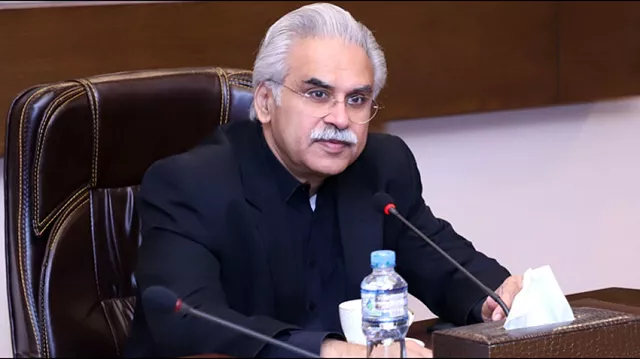PM’s aide defends PTI govt’s Covid ‘holistic strategy’
Dr Zafar Mirza says WHO only assessing situation through ‘health lens’
ISLAMABAD:Minister of State for Health Dr Zafar Mirza on Wednesday said the government was pursuing a “holistic strategy” to combat the coronavirus whereas the World Health Organisation, which had suggested that Pakistan should reimpose intermittent lockdowns to curb the spread of the disease, only assessed the situation through “health lens”.
He was responding to a letter from WHO Country Head for Pakistan Dr Palitha Mahipala to the Punjab health minister wherein it was noted that Pakistan did not meet “any of the prerequisite conditions for lifting the lockdown” and the government’s current strategy was not paying off given the sharp spike in Covid-19 cases in the country.
Dr Mirza said Pakistan was the fifth largest country in the world and the largest country in the WHO Eastern Mediterranean Region with two-third of its population dependent on daily incomes.
“Conscious of the disease spread and mortality and having put in place a very robust national coordinating and decision-making mechanism at the highest level we have made the best sovereign decisions in the best interest of our people,” he added.
“We have to make tough policy choices to strike a balance between lives and livelihoods.”
The state minister said the government had consciously but gradually eased generalised lockdowns but at the same time it had focused on the enforcement of Covid-19 standard operating procedures (SOPs) at shops, industry, mosques and public transport etc.
“Mask donning has been made compulsory in the country. Along with this we have developed a robust tracing, testing and quarantine policy to identify hotspots and cordon them off,” he explained. “Currently there are more than 700 such smart lockdowns in place. Other plank of our strategy is ramping up of our health system capacity to cater to the growing number of patient.”
Dr Mirza maintained that the government’s choice of policies had been guided by the best evidence available about the disease spread and its best assessment of the fast deteriorating socio-economic conditions in the country.
Defending the government’s efforts against the disease, the state minister said the National Command and Operation Center (NCOC), established under the auspices of National Coordination Committee (NCC) on Covid-19, met every morning at the ministerial level.
He added that with the help of technical experts, the NCOC reviewed the disease data and trends very minutely and took a holistic view of the situation along with the provinces.
“[NCOC] develops recommendations for the NCC that is chaired by the prime minister and participated by all the chief ministers and the prime minister of Azad Jammu and Kashmir. All decisions are made at the NCC [meetings] with consensus.”
The state minister said WHO was a specialised UN technical agency on health and it was the Pakistan’s longstanding partner during this pandemic and the country appreciate that.
“We understand that it is their [WHO] role to provide recommendations to member states but understandably theirs is the health-lens whereas governments have to take into account a holistic picture and make decisions on relative risk assessment basis and this has been the case in Pakistan.”
In the letter dated June 7, the UN health agency observed that Covid-19 cases in the country had increased sharply after the easing of the lockdown and Pakistan was now among the top 10 most affected countries. Noting that the government’s current strategy was not paying off, it recommended a two-week-on, two-week-off lockdown, as it offered the most chance of continuing economic activities while ensuring public health.
It noted that the virus had spread all over the country, and a large number of cases had been recorded in big cities.
The WHO had earlier recommended that any government seeking to ease movement restrictions needed to fulfill the six conditions: no unchecked disease transmission; a health system that can detect, test, isolate and treat every case and trace every contact; minimised hot-spot risks in vulnerable places, such as nursing homes; implementation of preventative measures in schools, workplaces and other essential places; a “managed” approach to the risk of importing new cases and public awareness among communities to live under a “new normal” of coronavirus.
It observed that Pakistan continued to exhibit a high positivity rate of 24% — above the required level of 5% — while the surveillance system to trace contacts was “weak.”
It also noted that the public was unwilling to adapt to change its behavior and adopt SOPs. “Pakistan has been ranked among the top 10 countries around the globe in reporting the highest number of new cases,” it warned, adding that the country needed to take strategic decisions to either tighten or implement public health measures that ensure economic prosperity, human rights, and food security.
Urging the government to expand its testing capacity to around 50,000 tests per day, the letter said that with its high positivity rate, Pakistan was potentially missing out on thousands of cases. “Cases increasing beyond 100,000 in Pakistan is a cause for concern,” the WHO added.


COMMENTS
Comments are moderated and generally will be posted if they are on-topic and not abusive.
For more information, please see our Comments FAQ